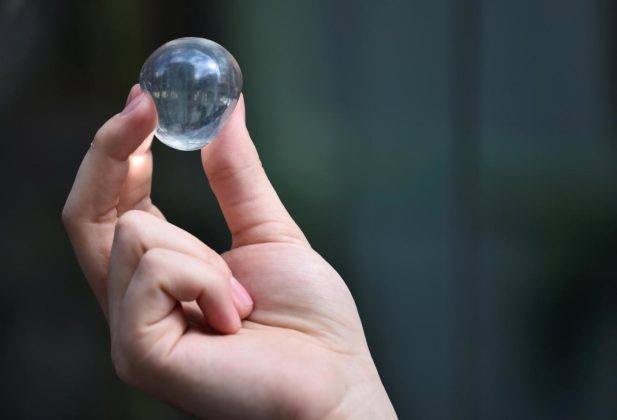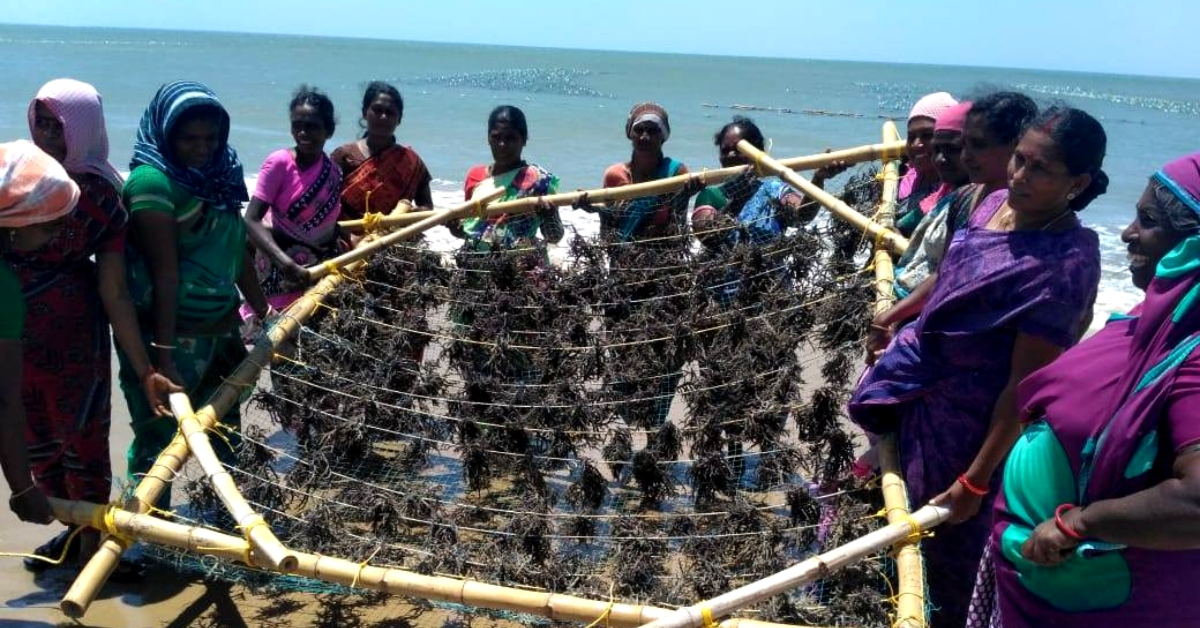The recent London Marathon made waves in the media for replacing about 2,00,000 plastic bottles with sports drink filled in edible pouches.
Marathons across the globe invite thousands of enthusiastic runners. While some eco-conscious runners carry their own bottles, hundreds fail to do so. The organisers thus arrange for plastic bottles to hand over to the participants at various check-points.
One can only imagine the amount of plastic each marathon costs the environment.
The sports drink that was distributed at the 2019 London Marathon was filled in edible packages made from seaweed. Runners could choose to eat the packaging as they drank the energy drink or discard it without impacting the environment.
This marathon prompted us to think about how India could take inspiration and replace its daily plastic waste with bioplastic made of seaweed instead.
1. Let’s begin with the “water pouch”

With over 7,500 km of coastline, India has easy access to abundant marine treasure in the form of seaweed. True, it can be argued that the seas should be kept safe from human intrusion. However, if you understand the impact that something as small as a straw or as massively used as plastic bottles has on marine life and health, seaweed alternatives to single-use plastic products can be seen in a fairly positive light.
Liquid pouches are one such example.
Plastic bottles are used once and thrown away in many social, sport and formal events. Once distributed, they cannot be taken back unless organisers actively collect and recycle them. The Ooho product by the UK-based Skipping Rocks Lab is a superb replacement for such bottles. Although they provide not more than a couple of sips, they are eco-friendly; using several of the packets will still cause no damage to the environment.
India can adopt this product to replace the bottles or sealed cups given in events, and even in flights.
2. Straws that grow in oceans—don’t pollute them
I recently saw a video featuring a rescue team that extracted a plastic straw out of a turtle’s nose. That visual hit home.
One may say that the oceans are too big to be damaged by a small straw, but that’s exactly where the problem lies.
Whether you are a fan of coconut water or like to drink juice to end your meal, by using a plastic straw, you are contributing to marine pollution.
Loliware, a US-based company has developed a dissolvable straw made of seaweed. With the tagline, ‘designed to disappear’, the organisation promises to replace the wasteful plastic straws with these eco-friendly alternatives.
Several states in India have imposed a ban on single-use plastics, as a result of which, you can see paper straws in many food chains. Although relatively eco-friendly, the paper straws still cost us in terms of trees. Perhaps seaweed straws could be a better option?
3. A dash of seaweed, anyone?
Highly nutritious, seaweed is considered a phenomenal food item—both tasty and healthy. A great source of protein, carbohydrates, minerals, polyunsaturated fatty acids and vitamins A, B, C and E, adding seaweed to your diet—even as a garnish—will increase the nutritional value manifold.
Perfect for both vegetarians and vegans, seaweed is a lovely seasoning that is already used widely in South East Asia. Maybe it’s time for India to adopt a new cuisine and try a delicious, nutritious dish?
4. A liquid seaweed fertiliser, courtesy Gujarat
Gujarat, a state that boasts of the longest coastline in India, has recently dived into the seaweed market. In 2018, the Central Salt and Marine Chemicals Research Institute (CSMCRI) in the state trained 18 farmers to commercially grow ‘gracilaria dura’—a non-edible seaweed that helped them collectively earn Rs 1.15 lakh within two cycles of harvest. Each cycle lasts 40 days.
The same CSIR has also developed a technology to make liquid seaweed fertiliser from the commercially-grown Kappaphycus sap–another variety of seaweed. This patented technology has found demand in Indian and international markets. Experiments with some plants being sprayed with the liquid fertiliser and others with the recommended doses of conventional fertilisers showed that the former were much healthier. Seaweed fertilisers could be an interesting field to tap into for agriculture.
5. Packed with love in seaweed.
Indonesian startup Evoware has developed a technology that could change the way we look at food packaging. Whether you love the occasional packet of wafers or instant noodles, you would have noticed the amount of plastic that you waste with every pack you consume.
The durable, odourless packaging material made from seaweed can be used to pack, say the seasoning of instant noodles, cereal, single-serving coffee or sugar sachets, and burger wraps. Considering the amount of single-use packs and sachets India uses, such technology can be developed further to replace plastic.
You May Also Like: Thanks to Indian Scientists, This Anti-Corrosive Seaweed Will Save The Seas!
Now, we are not saying that every packet of snacks in the market can be made of seaweed, but we can start somewhere.
(Edited by Shruti Singhal)
Like this story? Or have something to share? Write to us: contact@thebetterindia.com, or connect with us on Facebook and Twitter.
If you found our stories insightful, informative, or even just enjoyable, we invite you to consider making a voluntary payment to support the work we do at The Better India. Your contribution helps us continue producing quality content that educates, inspires, and drives positive change.
Choose one of the payment options below for your contribution-
By paying for the stories you value, you directly contribute to sustaining our efforts focused on making a difference in the world. Together, let's ensure that impactful stories continue to be told and shared, enriching lives and communities alike.
Thank you for your support. Here are some frequently asked questions you might find helpful to know why you are contributing?

